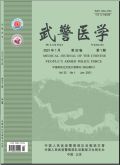武警医学2024,Vol.35Issue(5):410-416,7.
老年男性人群跌倒发生率及相关危险因素的现况调查
Prevalence survey on incidence of falls and related risk factors in elderly males
摘要
Abstract
Objective To systematically evaluate the incidence of falls in elderly male and investigate the risk factors associat-ed with falls.Methods A study was carried out on men over 60 years old.The general information,history of falls,living habits,medical history,physical examination information,exercise ability,muscle strength,walking ability,balance ability,cognitive status,and other indicators were collected to study the risk factors and related injuries of falls in the elderly.According to the history of falls within one year,the subjects were divided into a fall group and a non-fall group.The differences between the two groups were com-pared,and the relevant factors were explored by univariate and multivariate logistic regression analysis.Results A total of 520 older subjects were surveyed,with an average age of(77.21±9.70)years.The incidence of falls in the past year was 31.35%.The injury rate of previous falls was 33.6%and the incidence of disability was 31.9%.The highest risk time of falls was early in the morning and late night,and the highest risk places were bedrooms and bathrooms.Most falls occurred during walking,and the main ways of falling were slipping and tripping.The main reasons were slippery ground,obstacles,and complex personal causes.There were significant differences between fall group(n=163)and non-fall group(n=357)in age,activity of daily living(ADL),instrumental activity of daily living(IADL),minimum mental state examination,muscle strength of lower limbs,single leg balance test(SLBT),timed"up and go"test,five-time sit-stand test,gait speed,functional ambula-tion category scale,exercise history and multimorbidity state.Univa-riate logistic regression analysis showed that the risk factors for falls in elderly men were advanced age,poor function of IADL,stroke,or-thostatic hypotension,digestive disorder,musculoskeletal disorder,hearing loss,and other diseases,and the protective factors included exercise history,ADL,cognitive function,muscle strength of the low-er limb,SLBT,and walking ability and so on.Multivariate logistic regression showed that advanced age(OR=1.085,95%CI:1.026~1.147),stroke(OR=2.528,95%CI:1.118~5.717),and orthostatic hypotension(OR=2.845,95%CI:1.249~6.481)were the risk factors for falls in the elderly men,and good ability in ADL(OR=0.944,95%CI:0.931~0.959),lower limb strength(OR=0.842,95%CI:0.784~0.905),and SLBT(OR=0.705,95%CI:0.633~0.786)were the protective factors.Conclusions The in-cidence of falls in senile males is high,and the risk of fall increases with the increase of age.Injury and disability are common after falls.The related factors include self-reasons,time and environment.Elderly men with low level of ADL ability,insufficient strength of lower limb,poor balance ability,a history of stroke and orthostatic hypotension has a higher risk of falls.关键词
跌倒/老年/男性/横断面研究/患病率/危险因素Key words
fall/elderly/male/cross-sectional study/prevalence rate/risk factors分类
医药卫生引用本文复制引用
安慧妍,瓮长水,蒋天裕,刘淼,张丽..老年男性人群跌倒发生率及相关危险因素的现况调查[J].武警医学,2024,35(5):410-416,7.基金项目
国家老年疾病临床研究中心项目(NCRCG-PLAGH-2023007) (NCRCG-PLAGH-2023007)
首都卫生发展科研专项课题(首发2024-2-5031) (首发2024-2-5031)
山东省重点研发计划项目(2022SFGC0601) (2022SFGC0601)

